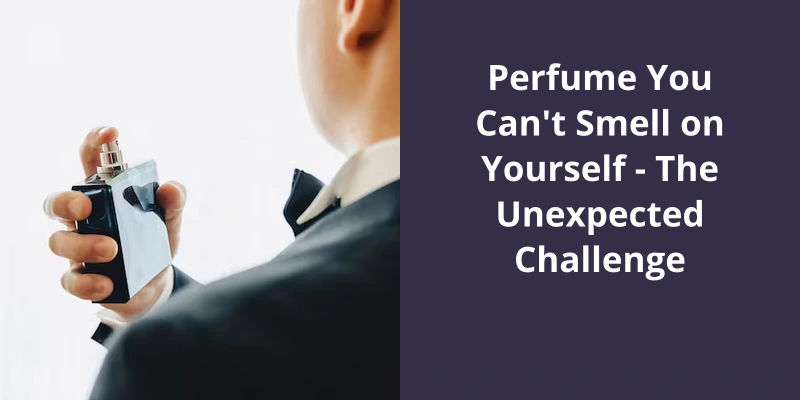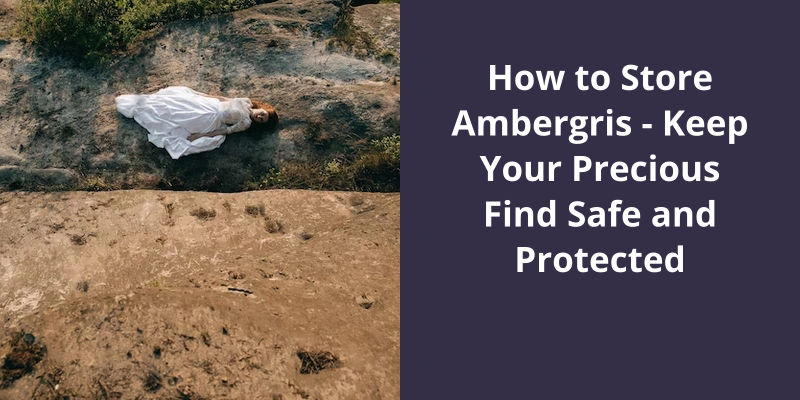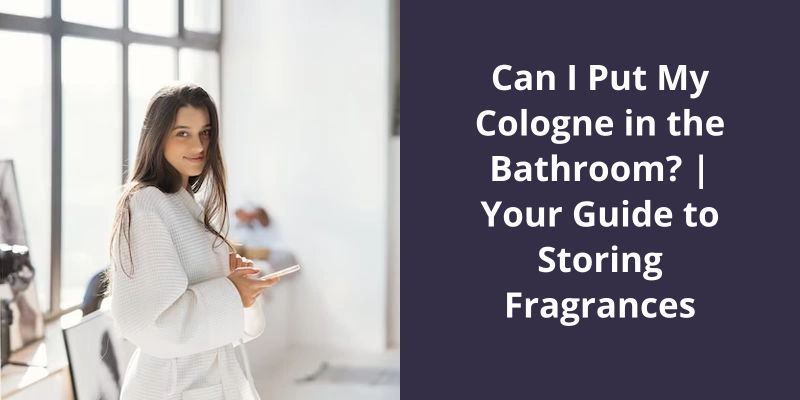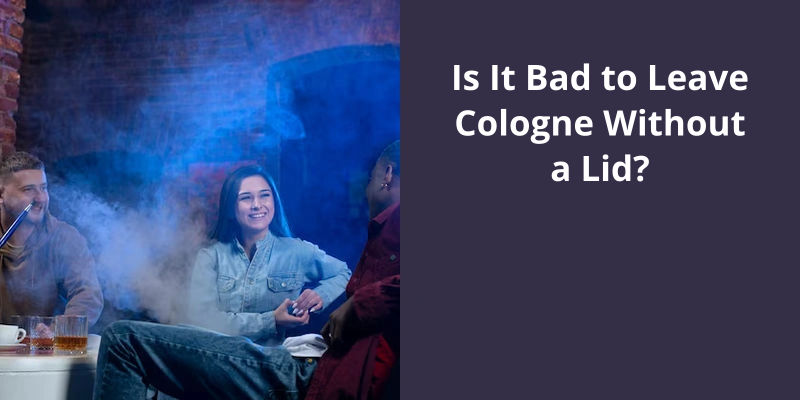The perfume you can’t smell on yourself is likely due to a common occurrence known as “olfactory fatigue” or “nose blindness.” This happens when your sense of smell gets used to the fragrance you are wearing, causing you to no longer notice it. It’s a form of sensory adaptation where the receptors in your nose that initially respond to the scent start to switch off. What can be surprising is that even when you can’t smell your own perfume, others around you often can. So, if you change scents regularly or switch between a few favourite fragrances, you can avoid nose-blindness and always be able to enjoy the perfume you’re wearing.

Why Can’t I Smell My Perfume After I Spray It?
Have you ever wondered why you cant smell your perfume after you spray it? It’s a frustrating and unexpected challenge that many of us have experienced. This phenomenon is known as “nose fatigue” or olfactory fatigue. After a few minutes of spraying a perfume on yourself, your nose becomes less sensitive to the scent and you may not be able to detect it anymore.
The reason behind this is quite fascinating. When we smell something, our nose registers that particular scent and sends signals to our brain to interpret it. However, after a while, our nose becomes saturated with the same smell, making it less noticeable or even undetectable. This is similar to how our eyes adjust to a steady light source and eventually stop perceiving it as clearly as before.
Perfume shops have found a clever way to combat this nose fatigue. They often offer customers coffee beans to smell in between testing different perfumes. The strong aroma of coffee helps to “reset” or cleanse the olfactory receptors in our nose, allowing us to smell other odors more clearly.
It’s important to note that nose fatigue is a temporary phenomenon and not something to be concerned about. Our sense of smell is incredibly sensitive and adaptable, which is why we may initially notice a strong fragrance but quickly become accustomed to it. This is also why we may not notice certain smells in our environment after being exposed to them for a while.
It’s simply your nose becoming desensitized to the scent. Perhaps try taking a quick sniff of some coffee beans or other contrasting scents to give your nose a break and enhance your olfactory experience. Happy smelling!
Other Factors That Can Affect Our Ability to Smell Perfume, Such as Humidity or Temperature
Aside from personal factors and olfactory fatigue, there are a few external factors that can impact our ability to smell perfume on ourselves. One of these factors is humidity. High humidity levels in the air tend to make smells more potent and can amplify the scent of a perfume, making it easier for us to detect it. On the other hand, low humidity levels can make the air dry and cause perfumes to evaporate quickly, resulting in a weaker scent or even no scent at all.
Another factor that plays a role is temperature. Warmer temperatures can enhance the volatility of fragrance molecules, allowing them to evaporate and travel through the air more easily. This can intensify the scent of a perfume and make it more noticeable on our skin. Conversely, colder temperatures can slow down the evaporation process, making the fragrance less prominent and more challenging to detect.
Considering these external influences, it’s important to keep in mind that the perception of scent can vary depending on the environmental conditions. Therefore, when trying a new perfume or assessing it’s longevity, it can be beneficial to test it in various humidity and temperature settings to better understand how it interacts with your body chemistry and the surrounding environment.
Our sense of smell is a complex and fascinating aspect of human perception. As we become accustomed to a particular fragrance, our brains adapt and associate it with our own body odor. This physiological process, known as olfaction, plays a role in why we can’t perceive our own fragrance. Let’s delve deeper into the intriguing science behind this phenomenon.
Why Can’t I Smell My Own Fragrance?
When we wear a fragrance regularly, the brain associates it with our own body odor. The fact that we no longer smell our perfume is part of a physiological process of olfaction. Our sense of smell is intelligent and adaptive, constantly assessing and categorizing different scents. It’s designed to detect new and unfamiliar smells, as those are often more relevant to our survival.
This phenomenon is known as olfactory fatigue or nose blindness. Our sensory receptors in the nose adapt to the constant presence of a particular fragrance, reducing their sensitivity to it over time. This is similar to how our ears become less sensitive to a continuous noise or our eyes adjust to prolonged exposure to a specific color.
Additionally, the way our brains process scent plays a role in our inability to smell our own perfume. The olfactory system is closely connected to the limbic system, which is responsible for emotions and memory. This connection often triggers emotional and memory responses rather than a conscious perception of the scent itself.
Furthermore, the act of smelling involves the movement of air and the interaction of scent molecules with the olfactory receptors in our nose. When we apply perfume to ourselves, the scent molecules disperse into the air around us, making it more difficult for our olfactory receptors to detect them. The concentration of scent molecules diminishes as they spread out, making it harder for us to perceive the fragrance.
While we may not be able to enjoy our own fragrance in the same way as others do, this unique challenge allows us to experience the wide array of scents that exist in the world.
This sensory phenomenon, known as anosmia, isn’t only experienced by our grandma but also by individuals in the fragrance industry. Overexposure to a particular scent can diminish our ability to detect it, resulting in a loss of olfactory perception.
What Is It Called When You Can’t Smell Your Perfume?
What’s it called when you cant smell your perfume? In the fragrance industry, we also use anosmia to describe losing the ability to detect a certain scent due to lengthy overexposure. Our grandma above is suffering from anosmia — 50 years spent spritzing the same perfume can inhibit your ability to smell it.
The inability to smell your own perfume can be seen as an unexpected challenge, especially for those who’ve been used to relying on their sense of smell to gauge their own scent. It can make it difficult to determine if you’ve applied too much or too little fragrance. Additionally, not being able to smell your own perfume can also impact how others perceive you, as scent plays a significant role in ones overall impression.
To overcome this challenge, individuals who experience anosmia with their perfume can try a few strategies. One approach is to ask for feedback from trusted friends or family members to gauge if the fragrance is still noticeable. Another option is to switch up the perfume occasionally, allowing the olfactory system to reset and regain sensitivity to the scent. Additionally, it can be helpful to give your nose a break by avoiding wearing any fragrance for a period of time.
However, by being aware of the phenomenon of anosmia and exploring different approaches to overcome it, individuals can continue to enjoy wearing their favorite scents and feel confident in how they present themselves to others.
Anosmia and It’s Impact on Daily Life: This Topic Could Delve Deeper Into the Challenges and Frustrations That Individuals With Anosmia Face, Beyond Just Not Being Able to Smell Their Perfume. It Could Include Difficulties With Detecting Odors in Food, Recognizing Dangerous Smells, or Enjoying Certain Environments.
Anosmia, the loss of the sense of smell, can have a significant impact on daily life. While not being able to smell one’s own perfume is an unexpected challenge, it’s just the tip of the iceberg. Anosmia can make it difficult to detect odors in food, leading to reduced enjoyment of meals and potentially affecting appetite. Additionally, the inability to recognize dangerous smells, such as smoke or gas leaks, can pose serious risks to personal safety. Moreover, individuals with anosmia may miss out on the sensory experiences and emotional connections associated with certain scents, like the aroma of a loved one or the scent of nature. The challenges and frustrations faced by those with anosmia go far beyond simply not being able to smell their perfume.
Source: Why can’t we smell our own perfume?..
By strategically applying your favorite floral perfumes on areas other than directly under your nose, such as the top of your ear or behind your knees, you can ensure that others can still enjoy your fragrance even if you can’t smell it yourself.
Can People Smell Your Perfume if You Can’t Smell It?
When it comes to fragrance, one of the unexpected challenges is the fact that you cant smell it on yourself. While you may be able to enjoy the scent for a few moments after applying it, you soon become nose-blind to your own perfume. However, this doesn’t mean that others cant smell it on you. In fact, the fragrance may still be noticeable to those around you, even if you cant detect it anymore.
To overcome this challenge, it’s important to consider certain application techniques. Instead of focusing on areas that are directly under your nose, try applying your favorite floral perfumes on areas that are more likely to emanate the scent throughout the day. For example, the top of your ear or behind your knees are spots that can release fragrance when you move, allowing others to catch a whiff.
Moreover, you can also experiment with layering your fragrance. By using scented body lotions or oils in conjunction with your perfume, you can increase the longevity of the scent and make it more noticeable to others. Additionally, opting for stronger concentrations, such as eau de parfum rather than eau de toilette, can also help ensure that your fragrance stays noticeable.
Another tip to consider is to ask for feedback. Even if you cant smell your perfume, others can, and they can provide valuable insights on how strong or subtle the scent is on you. Dont hesitate to politely ask a friend or colleague if they can still smell your fragrance throughout the day. This feedback can help you gauge the longevity and projection of your perfume, allowing you to adjust your application technique if needed.
Lastly, keep in mind that personal perception plays a role in this challenge. We become accustomed to our own scent, which can make it difficult for us to detect it over time. However, rest assured that others can still enjoy your fragrance. So, embrace the beauty of perfume and experiment with different application techniques to make sure your scent is never forgotten, even if you cant smell it yourself.
How to Choose the Right Perfume for Your Body Chemistry
Choosing the right perfume that compliments your body chemistry can be a challenging task. Each person’s body chemistry reacts differently with various scents, making it essential to find a perfume that enhances your natural scent rather than overpowering it.
When selecting a perfume, consider your skin type and personal preferences. Oily skin tends to hold scents longer, while dry skin may require reapplication throughout the day. Perfumes with stronger base notes like musk or amber might work well for those with dry skin, while floral or citrus scents are ideal for oily skin.
It’s also crucial to test the fragrance on your skin before purchasing. Spray a small amount on your wrist or inner elbow and let it settle for a few hours. This will allow you to evaluate how the scent evolves over time and how it interacts with your body chemistry.
Remember that perfumes smell differently on each individual, so it’s important to trust your own senses rather than relying solely on recommendations or reviews. Don’t be afraid to experiment with different fragrances until you find the perfect one that matches your body chemistry and makes you feel confident and delightful.
Take a subtle sniff: Inhale gently and try to detect the scent yourself. If you can smell it, chances are others will too. Assess the reactions: Pay attention to any comments or compliments you receive about your perfume. If people are noticing and commenting on it, it’s a good indication that it’s noticeable.
How Do You Know if People Can Smell Your Perfume?
Observe peoples reactions: Pay attention to the facial expressions and body language of those around you. If someone wrinkles their nose or moves away, it could be a sign that your perfume is too strong. On the other hand, compliments or questions about the scent indicate that it’s noticeable and pleasing.
Ask for feedback: If youre unsure about how noticeable your perfume is, don’t hesitate to ask a trusted friend or family member for their opinion. They can provide you with honest feedback and help you gauge the strength of your fragrance.
Consider the location: The environment youre in can affect how easily your perfume is detected. In a crowded space or outdoors, the scent may disperse more quickly, making it harder for others to smell. However, in a closed or confined space, your perfume may be more noticeable.
Take note of longevity: Some perfumes have better staying power than others. If you find that your fragrance fades quickly, it may not be easily detectable by others. Longer-lasting scents are more likely to be noticed throughout the day.
Experiment with different application techniques: The way you apply your perfume can influence how noticeable it is. Try spraying it on your skin rather than your clothing, as the heat of your body can help the fragrance project. You can also try layering scented products, such as using a matching body lotion or shower gel, to enhance the longevity and projection of the scent.
By following these steps, you can become more aware of how noticeable your perfume is to others. Finding the right balance between a fragrance that’s neither too weak nor too overpowering will ensure that you make a pleasant olfactory impression without overwhelming those around you.
How to Choose the Right Perfume Strength: It Can Be Helpful to Understand the Different Perfume Strengths Available, Such as Eau De Parfum, Eau De Toilette, and Eau De Cologne, and How They Vary in Intensity. This Will Help Readers Select a Fragrance Strength That Suits Their Preference and the Level of Projection They Desire.
- It can be helpful to understand the different perfume strengths available, such as eau de parfum, eau de toilette, and eau de cologne, and how they vary in intensity.
- This will help readers select a fragrance strength that suits their preference and the level of projection they desire.
Conclusion
It raises a paradoxical question: can we truly enjoy and appreciate a fragrance if we can’t personally detect it? Moreover, it mandates a shift in focus from personal enjoyment to external impact, as we become attuned to the reactions and responses of those around us. Furthermore, this challenge fosters a new level of self-awareness and mindfulness, urging us to pay closer attention to our physical and emotional presence.





